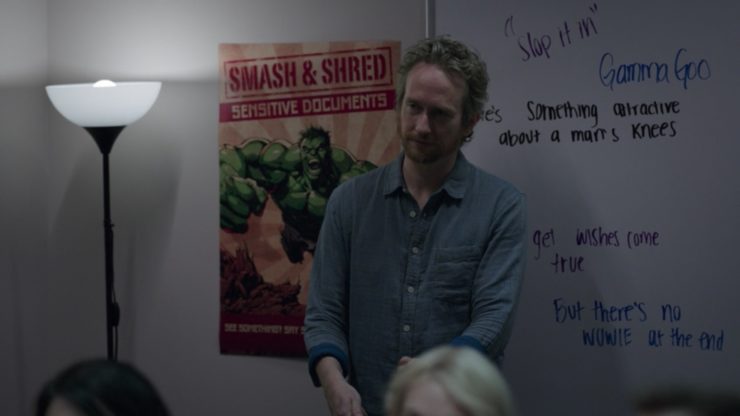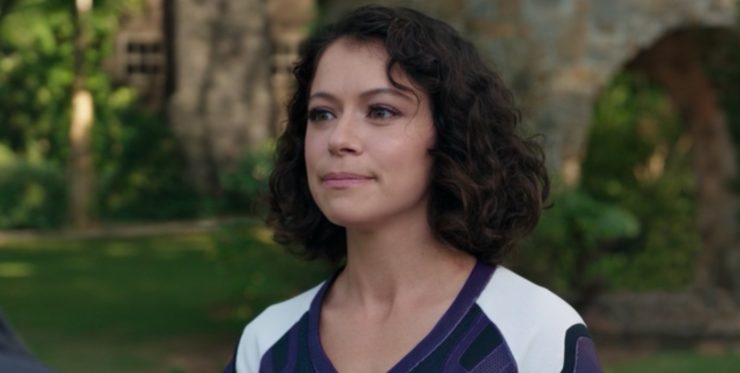Well, that was something, wasn’t it? I can make one very definitive statement about a season finale that left me with a lot of mixed feelings: It certainly did some things I did not expect.
And the episode signals from the very start that this is no ordinary episode of TV. The intro we glitch right into is straight from 1978’s The Incredible Hulk, and it’s both a delight and a hint of the extra meta-ness to come. It’s just Jen’s dream, but it feels as likely as anything.
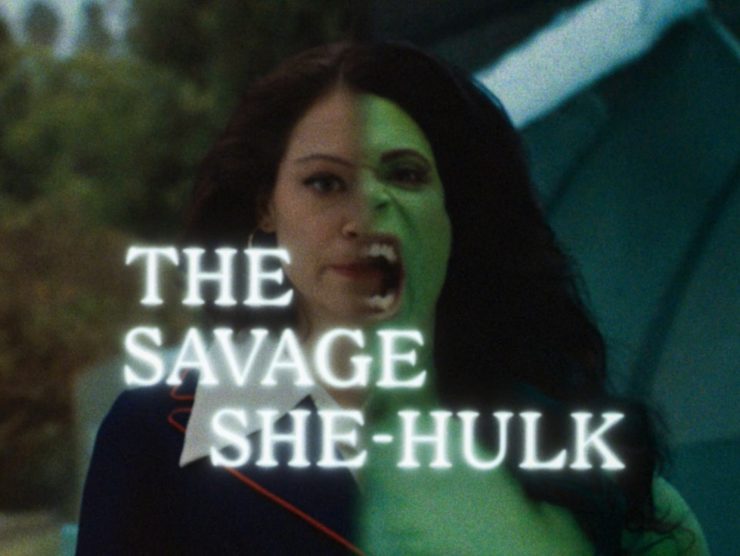
So Jen’s in prison because she took Intelligencia’s bait, and all anyone saw was an out of control Hulk. Poor underused Mallory Book brings her trademark hardass-ness to bear here and it’s one of the most emotionally effective moments; we know Mallory has a softer interior, but when she’s all business, she doesn’t leave any room for squish.
Much of the tactics and language She-Hulk’s writers use is unnerving because it’s so real and relatable—for example, the neighbors who claim they don’t feel safe living near Jen, or Dennis (UGH) going on TV to straight-up lie about his relationship with Jen, and about her personality. The media follows her from her empty apartment to her parents’ house, where Jen does what countless disgraced, disappointed, and wounded ordinary people have done: moves home to regroup and lick her wounds. But: “We’re not doing a narrator. We’re not that off the rails.”
(The fourth-wall breaking slowly building is one of this episode’s most elegant choices.)
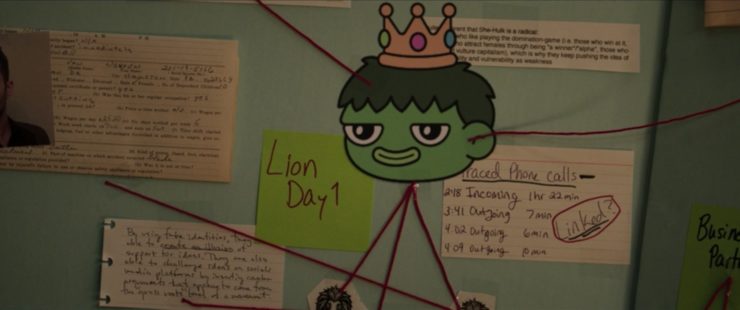
The plot, such as it is, is simple: Jen gets out of prison, loses her job, moves home, but doesn’t give up; Nikki and Pug are on her team, and Nikki has the horrible, clever, awful, uncomfortable idea to use Jen’s mom’s video of college Jen’s goofy dancing to break into the Intelligencia world. And everything goes exactly as planned: Pug goes undercover into their gathering, Todd reveals himself as HulkKing and the mastermind of it all, Emil shows up as the men’s rights life coach, and Jen stumbles onto all of this, having run off to Emil’s retreat for a mental health break. Everything converges! Titania appears! Bruce returns from space!
Except that climax, in a word, sucks.
So Jen takes matters into her own hands.
For all my complicated feelings about how this plays out, I love this concept. I love Jen smashing her way all the way through that fourth wall, through the Disney+ menu screen (is this the whole reason that Assembled thing exists? I certainly like to think so), through the Marvel lot, through the (actual) writers’ room, past the absurd and probably realistic NDA, and into the company of Kevin.
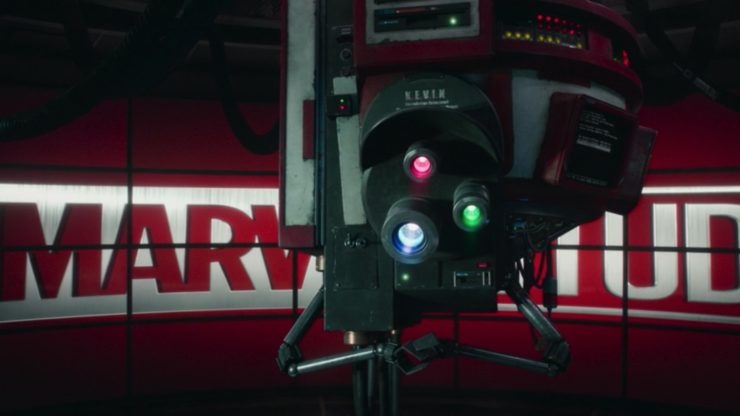
Or should I say: K.E.V.I.N.: Knowledge Enhanced Visual Interconnectivity Nexus. This is not Kevin Feige, Marvel mastermind; this is an AI which comes up with all Marvel’s plots. And after he tells She-Hulk to turn back into Jen for budget reasons (off-camera, please, ha ha), Jen gives him a piece of her mind. A piece of many of our minds, really.
Is this enjoyable? It sure is. Yes, I enjoyed someone in-universe calling Marvel on their tiresome run of daddy issues! Yes, this exchange might have been my favorite thing in the entire episode!
“A woman has needs.”
“Historically, we’ve been light in that department.”
This is what the lawyer show has been building to, and what the cliched plot threads have been building to: Jen making a case that it can be better. That a story doesn’t have to be made up of all the stories that came before it (right down to Hulk blood/supersoldier serum plots!). That a show in which our heroine regularly breaks the fourth wall should not have an ending that feels synthesized from previous Marvel endings and allows the male characters to stomp all over her narrative. That there is a point to the fourth-wall breaking. It’s not just for shits and giggles. It’s for Jen to take control, to talk to us about her narrative, and then to talk to K.E.V.I.N. about her narrative. It’s for a woman to say “You’re not doing right by me,” quite forthrightly and clearly.
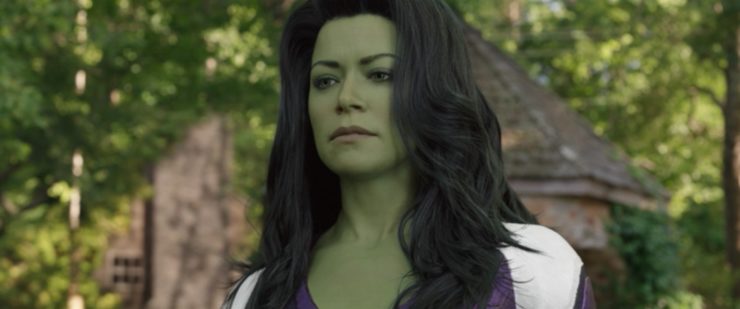
And then she gets her ending, in which she faces Todd as Jen, no smashing needed, and Daredevil shows up in broad daylight, which was truly the most disconcerting moment of an episode that was full of them. (Ditto Matt’s light blue plaid in the last scene!) Everything wraps up—on Jen’s terms. In-show, I love it. Creator Jessica Gao and her team did something really, truly different with Jen’s story. They gave us a handful of perfect secondary characters, like a fun lawyer show would. They kept the stakes grounded, for the most part, resisting the temptation to fly up and off the personal-level handle, and keeping the Giant Marvel Plotline intrusions to a relative minimum.
They gave us Emil Blonsky, haiku-writing life coach, for crying out loud! There’s cleverness and there’s sweetness, and through it all there’s Maslany, who is so good I actually did forget about Orphan Black from time to time. I don’t know that this could’ve worked without her.
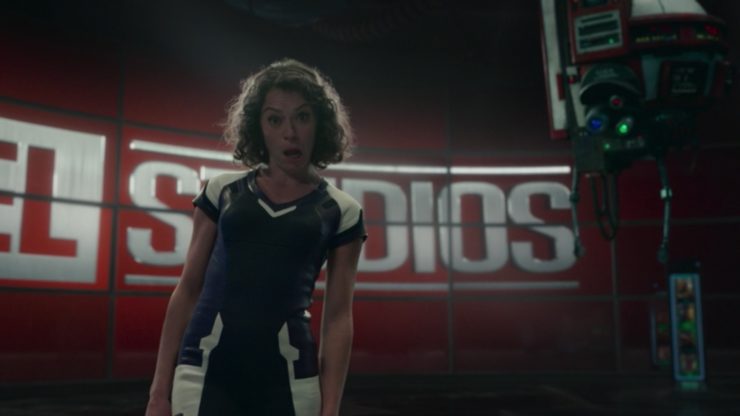
But in the bigger picture, the meta-finale feels a little bit like being patted on the head and given a cookie. It’s a very safe way for Marvel to acknowledge many complaints viewers have had over the years and years of Marvel movies, without necessarily doing anything about it outside the confines of this one show. Maybe, just maybe, a person might hope that Jen giving new data to K.E.V.I.N. will affect how future stories get told. But that requires a level of optimism that I don’t think Marvel has earned. I am incredibly glad that this show—the finale in particular—gets to exist on its own terms. But that doesn’t change the fact that in order to reset the climax, we still had to have a whole season of that plot: of the Hulk blood threats, of the Intelligencia, of the still-mystifying Titania, and of really heavy shit still unaddressed.
Yes, I’m sorry, but we need to talk about Josh.
I didn’t bring this up last week because I wanted to wait and see if the show would do anything about it. But it just slips by, barely acknowledged, just part of the general awful misogyny of Intelligencia overall. What Josh did, beyond the obvious phone-copying and invasion of privacy … well, it probably varies from state to state. But he slept with Jen under false pretenses. Using fraud to convince someone to sleep with you is a form of rape. When it became clear what Josh had done, I had a really unpleasant visceral reaction, imagining how it would feel to be in Jen’s position. Her anger is more than justified. But she only gets a moment of it,, at the end of the previous episode. It never comes up again. Todd gets his legal comeuppance. But what of Josh? Where was he, in that barn gathering? Why put something this heavy and awful in the show and then back fully away from it?
And if right now you’re asking yourself, Why is this critic going on about such an ugly part of the series? Isn’t this show supposed to be fun? Yeah, it told us it’s a fun lawyer show. But the writers also decided to go down this very real story rabbithole about the kind of men who use the internet to destroy women’s lives. That is a real life issue, not just a superhero issue, and the story ducks the real-life part of it in favor of the superhero part, even as Jen defeats Todd on her own Jen terms, no smashing required.
It just doesn’t entirely sit right with me.
But: Yes to fourth wall breaking! Yes to Marvel menu smashing! Yes to “Bruce smashes buildings; I smash fourth walls and bad endings. And sometimes Matt Murdock,” a line which Maslany delivers with such perfect gusto that it goes a long way to begin to make up for many years of women’s sexual desires being an afterthought at best in Marvel Land. Yes to Bruce coming back but not to save the day; yes to Bruce casually introducing his son, Skaar (Will Deusner), in a way that does not usurp the storyline from Jen.
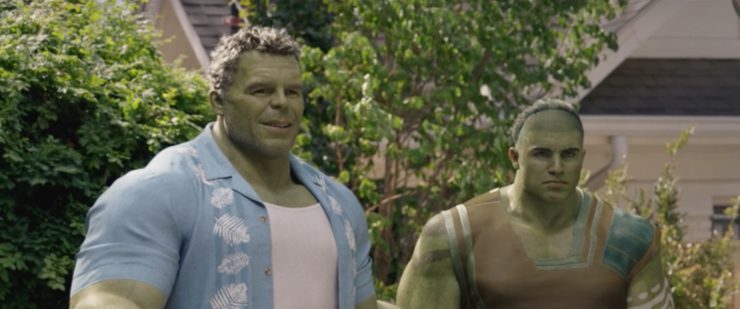
(I was less psyched about the post-credits scene, but still: Everyone loves Wongers, myself included.)
Overall, She-Hulk succeeds in something the Marvel shows have struggled with: It is its own show. It doesn’t struggle to connect to bigger storylines, or suffer from having extra characters wedged in for nefarious Marvel purposes. Many of the conceits—the lawyer show, the fourth-wall breaking, the duality of Jen/She-Hulk and how Jen needs to accept the strengths of both sides of herself—are specific to the show. Women are always asked if they can “have it all,” which usually means a career and children. Jen’s version of having it all is very, very different, but the challenges specific to her experience are still relatable.
I do wish the origin story had gotten held until the end. The becoming She-Hulk sequences with Ruffalo were good, but they also suggested an angrier Jen than the character we actually got. She has all those good lines about “angry” being the baseline of a woman in the world, but then for most of the series, Jen is pretty easygoing, sometimes a pushover. If that whole training sequence had been a flashback that came after her rage comes out at the gala, it would’ve been different. We would’ve met Jen on normal Jen terms and gotten to know her—and then, after she (understandably) snaps, gotten all that insight into how she really feels. Into all that anger, held under, carefully balanced so that no one can see it. Anger that so many women are carrying.
That’s the true tension of She-Hulk: It’s a comedy, in theory; it’s a lawyer show; it’s a woman’s story that has strong ties to a lot of stories dominated by men—and it’s fueled by an anger that it can’t often show. There’s truth in that, and an emotional heftiness that is sometimes tucked behind the cleverness (and the occasional stumbles). But it’s there, and it’s real, and I hope we get another season or four of it—seasons in which Jen’s story really gets to be her own.
Also, I just really love this note about knees.
